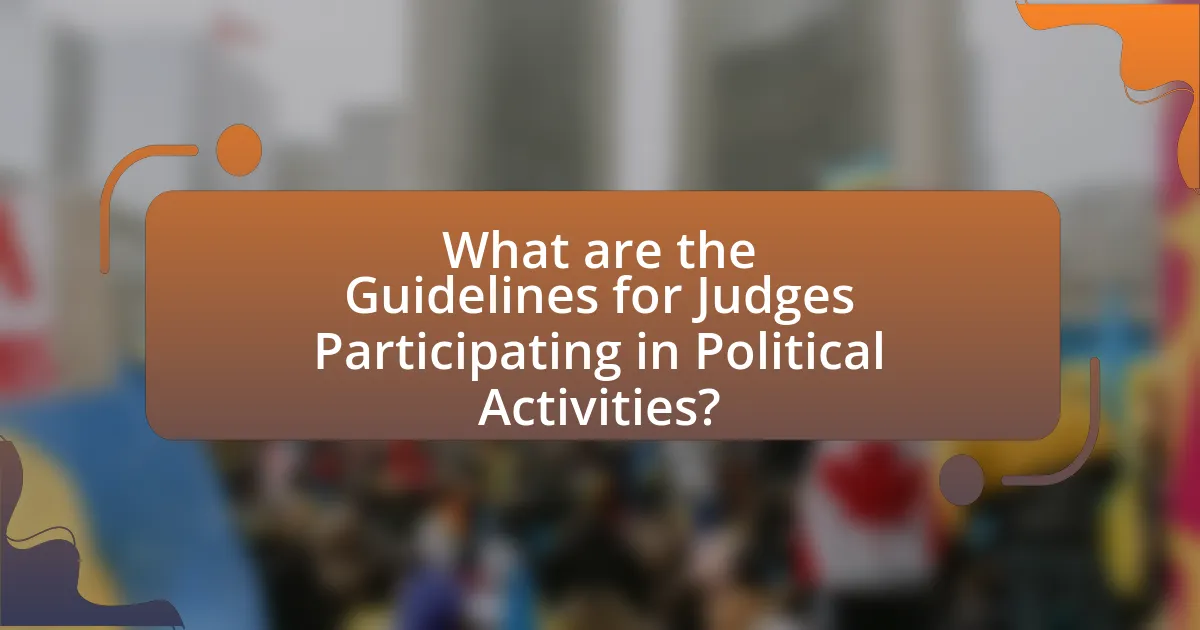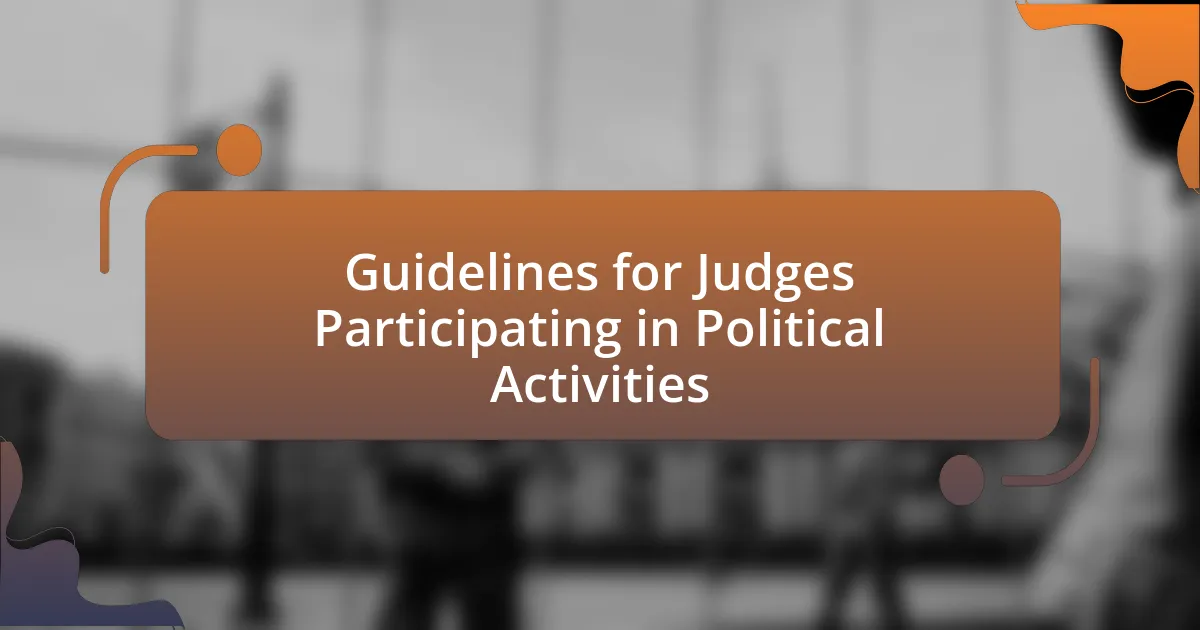The article focuses on the guidelines governing judges’ participation in political activities, emphasizing the importance of maintaining judicial integrity and impartiality. It outlines the prohibitions against judges running for office, endorsing candidates, or engaging in partisan politics, as established by the American Bar Association’s Model Code of Judicial Conduct. The article discusses the potential conflicts of interest that can arise from political involvement, the consequences of violating these guidelines, and the variations in regulations across different jurisdictions. Additionally, it highlights best practices for judges to navigate community engagement while upholding their ethical responsibilities.

What are the Guidelines for Judges Participating in Political Activities?
Judges are generally prohibited from engaging in political activities to maintain the integrity and impartiality of the judiciary. According to the American Bar Association’s Model Code of Judicial Conduct, judges must avoid political activity that undermines their independence, integrity, or impartiality. Specifically, judges cannot run for office, endorse candidates, or engage in partisan political activities. This prohibition is rooted in the principle that judicial decisions should be based solely on the law and facts, free from political influence. The guidelines aim to preserve public confidence in the judicial system by ensuring that judges remain neutral arbiters of the law.
Why are these guidelines important for judges?
These guidelines are important for judges because they ensure the integrity and impartiality of the judiciary. By adhering to these guidelines, judges maintain public confidence in the legal system, which is essential for the rule of law. Research indicates that perceived impartiality is crucial for the legitimacy of judicial decisions, as demonstrated in studies showing that public trust in the judiciary declines when judges engage in political activities. Therefore, these guidelines help prevent conflicts of interest and uphold the ethical standards necessary for judges to perform their duties effectively.
What potential conflicts arise from judges engaging in political activities?
Judges engaging in political activities can create conflicts of interest that undermine the impartiality of the judiciary. Such involvement may lead to perceptions of bias, as judges are expected to remain neutral arbiters of the law. For instance, if a judge publicly supports a political candidate or party, it raises questions about their ability to fairly adjudicate cases involving that candidate’s policies or supporters. Additionally, participation in political activities can compromise the public’s trust in the judicial system, as seen in various cases where judges faced scrutiny for their political affiliations, leading to calls for recusal in politically charged cases. This potential erosion of public confidence in judicial impartiality highlights the critical need for judges to adhere to strict ethical guidelines regarding political engagement.
How do these guidelines uphold the integrity of the judiciary?
These guidelines uphold the integrity of the judiciary by establishing clear boundaries for judges’ involvement in political activities, thereby preventing conflicts of interest and maintaining public confidence in judicial impartiality. By prohibiting judges from engaging in partisan politics, the guidelines ensure that judicial decisions remain free from political influence, which is essential for a fair legal system. For instance, the American Bar Association’s Model Code of Judicial Conduct emphasizes that judges must avoid any appearance of bias or favoritism, reinforcing the principle that the judiciary operates independently from political pressures. This adherence to ethical standards fosters trust in the judicial system, as the public can be assured that judges will make decisions based solely on the law and facts, rather than political affiliations or motivations.
What are the key principles outlined in the guidelines?
The key principles outlined in the guidelines for judges participating in political activities include maintaining impartiality, avoiding conflicts of interest, and upholding the integrity of the judiciary. These principles ensure that judges do not engage in political activities that could compromise their ability to perform their judicial duties fairly and without bias. For instance, judges are advised to refrain from endorsing candidates or participating in political campaigns to preserve public confidence in the judicial system.
What restrictions are placed on judges regarding political endorsements?
Judges are restricted from making political endorsements to maintain impartiality and public confidence in the judiciary. Specifically, the American Bar Association’s Model Code of Judicial Conduct prohibits judges from engaging in political activity that undermines their independence, integrity, or impartiality. This includes endorsing candidates for public office, which is outlined in Rule 4.1 of the Model Code. Such restrictions are designed to prevent any appearance of bias or favoritism, ensuring that judges remain neutral arbiters of the law.
How do the guidelines address campaign contributions from judges?
The guidelines prohibit judges from personally soliciting campaign contributions from individuals or entities that are likely to appear before them in court. This restriction aims to maintain the integrity and impartiality of the judiciary by preventing any potential conflicts of interest. Additionally, the guidelines require judges to ensure that their campaign contributions comply with applicable laws and regulations, reinforcing the principle that judicial conduct must uphold public confidence in the legal system.
What are the consequences of violating these guidelines?
Violating the guidelines for judges participating in political activities can lead to disciplinary actions, including censure, suspension, or removal from the bench. These consequences are enforced to maintain the integrity and impartiality of the judiciary, as judges are expected to uphold the law without bias. For instance, the American Bar Association’s Model Code of Judicial Conduct outlines that judges must avoid political activities that could undermine public confidence in their impartiality, and failure to adhere to these standards can result in formal complaints and investigations by judicial conduct organizations.
What disciplinary actions can be taken against judges who breach the guidelines?
Judges who breach the guidelines for participating in political activities can face disciplinary actions such as censure, suspension, or removal from office. These actions are typically enforced by judicial conduct boards or commissions that oversee judicial behavior, ensuring adherence to ethical standards. For instance, the American Bar Association outlines that violations can lead to sanctions ranging from reprimands to disqualification from serving as a judge, depending on the severity of the breach.
How do violations impact public perception of the judiciary?
Violations of ethical standards by judges significantly undermine public perception of the judiciary. When judges engage in misconduct or political activities that conflict with their impartial role, it erodes trust in their ability to administer justice fairly. Research indicates that public confidence in the judiciary declines when instances of judicial misconduct are reported, as seen in surveys where 70% of respondents expressed concern over the integrity of judges following high-profile violations. This decline in trust can lead to a perception that the judiciary is biased or politically influenced, further complicating the relationship between the public and the legal system.
How do these guidelines vary across different jurisdictions?
Guidelines for judges participating in political activities vary significantly across different jurisdictions, reflecting diverse legal frameworks and ethical standards. For instance, in the United States, the American Bar Association’s Model Code of Judicial Conduct allows judges to engage in political activities but imposes restrictions to maintain judicial impartiality, while some states have stricter rules prohibiting judges from participating in partisan politics altogether. In contrast, jurisdictions like Canada permit judges to engage in political activities, provided they do not compromise their impartiality or the integrity of the judiciary. These variations are influenced by local laws, cultural attitudes towards judicial independence, and the historical context of judicial roles in governance.
What are the differences in political activity regulations for judges in various states?
Political activity regulations for judges vary significantly across states, with some states imposing strict limitations while others allow more leeway. For instance, in states like California and New York, judges are prohibited from engaging in partisan political activities, including campaigning for candidates or contributing to political parties. Conversely, states such as Texas and Florida permit judges to participate in political campaigns, provided they do not run for office themselves. Additionally, the American Bar Association’s Model Code of Judicial Conduct serves as a guideline, but individual states can adopt or modify these rules, leading to discrepancies in enforcement and interpretation. This variation underscores the importance of understanding specific state regulations to ensure compliance with ethical standards governing judicial conduct.
How do federal guidelines compare to state-level regulations?
Federal guidelines generally establish a baseline for judicial conduct regarding political activities, while state-level regulations can impose stricter standards. For instance, the Code of Conduct for United States Judges, which is a federal guideline, prohibits judges from engaging in political activities that could undermine their impartiality. In contrast, some states have additional rules that further restrict judges’ political involvement, such as prohibiting them from endorsing candidates or participating in political campaigns altogether. This variance illustrates that while federal guidelines provide a framework, state regulations can enhance ethical standards for judges, ensuring a higher level of impartiality and public confidence in the judiciary.
What best practices should judges follow to navigate political activities?
Judges should maintain impartiality and avoid political activities that could compromise their integrity. This includes refraining from endorsing candidates, participating in political campaigns, or engaging in partisan political discussions. The American Bar Association’s Model Code of Judicial Conduct emphasizes that judges must not only avoid impropriety but also the appearance of impropriety in all activities, including political ones. By adhering to these guidelines, judges uphold public confidence in the judiciary and ensure that their decisions remain unbiased and fair.
How can judges maintain impartiality while engaging in community activities?
Judges can maintain impartiality while engaging in community activities by adhering to ethical guidelines that prevent conflicts of interest and ensure neutrality. These guidelines often include avoiding participation in partisan political events, refraining from endorsing candidates, and being transparent about their community involvement. For instance, the American Bar Association’s Model Code of Judicial Conduct emphasizes that judges should not engage in activities that could undermine public confidence in their impartiality. By following these principles, judges can actively participate in their communities while safeguarding their judicial integrity.
What resources are available for judges to understand their rights and limitations?
Judges can access various resources to understand their rights and limitations, including judicial ethics codes, state-specific guidelines, and educational programs. The American Bar Association provides a Model Code of Judicial Conduct, which outlines ethical standards and limitations for judges. Additionally, many state judicial organizations offer resources tailored to local laws and regulations, ensuring judges are informed about their rights in political activities. Legal seminars and workshops also serve as platforms for judges to learn about their responsibilities and limitations in engaging with political matters, reinforcing their understanding through expert-led discussions and case studies.
